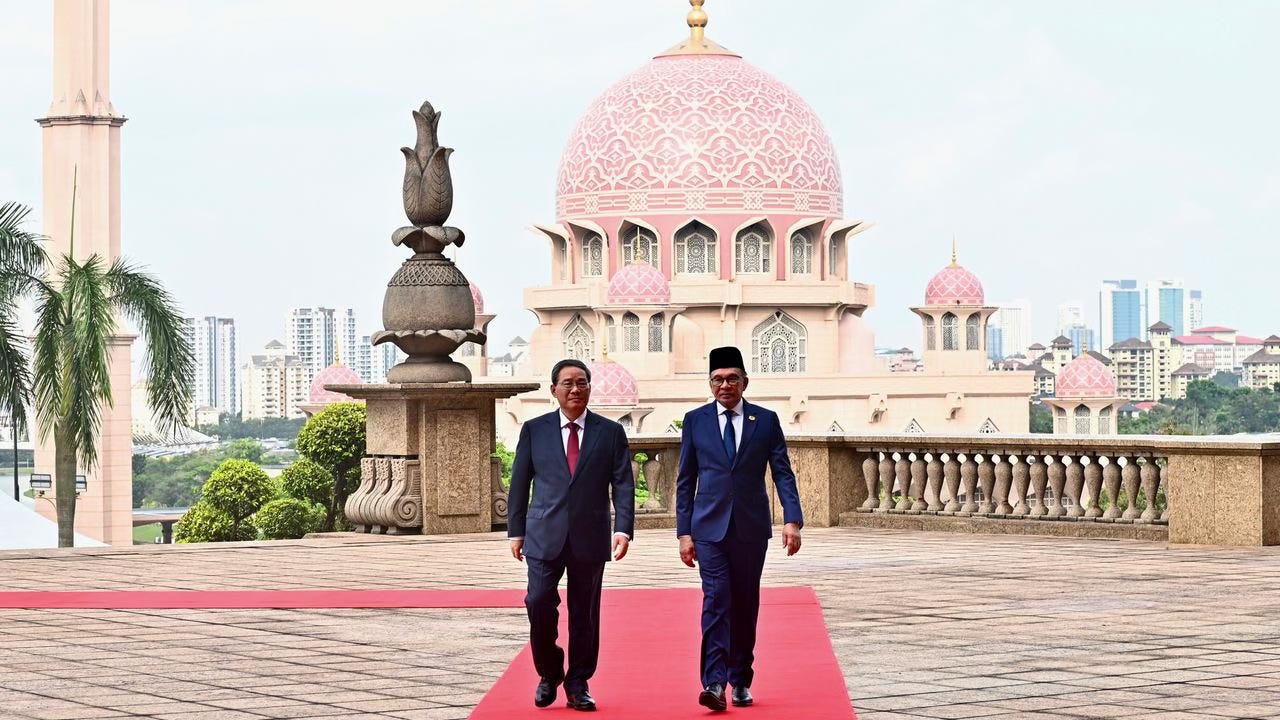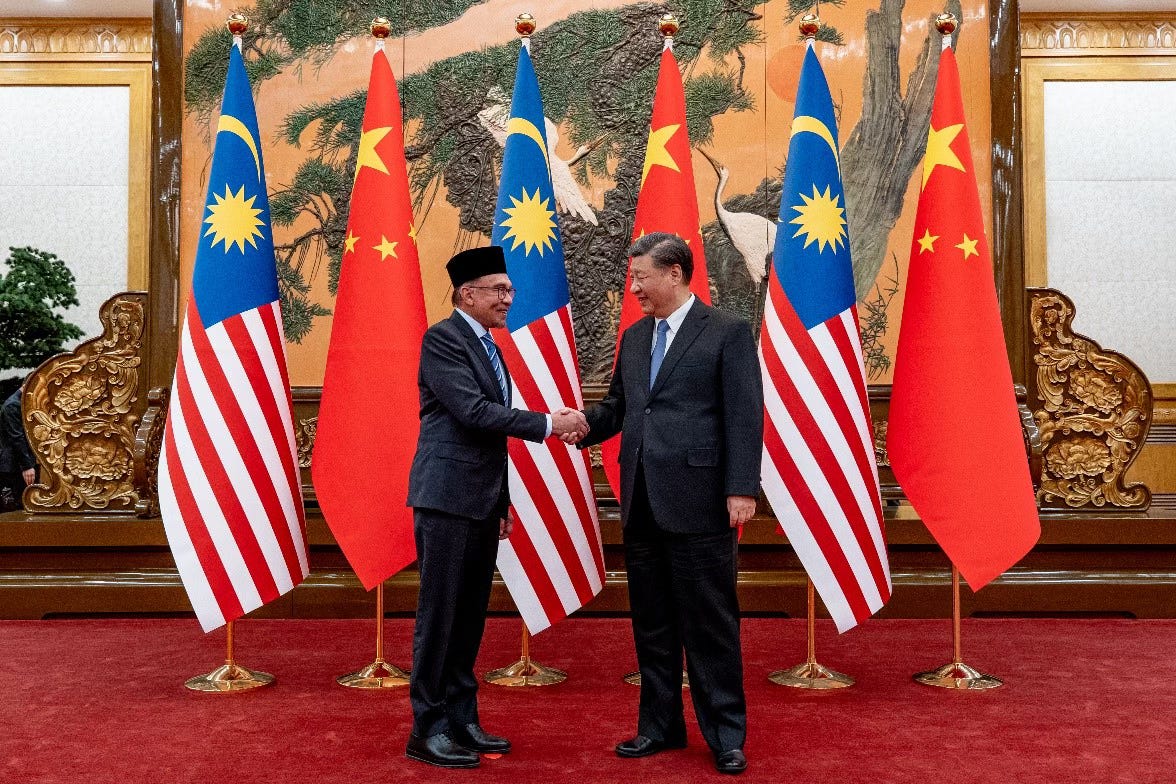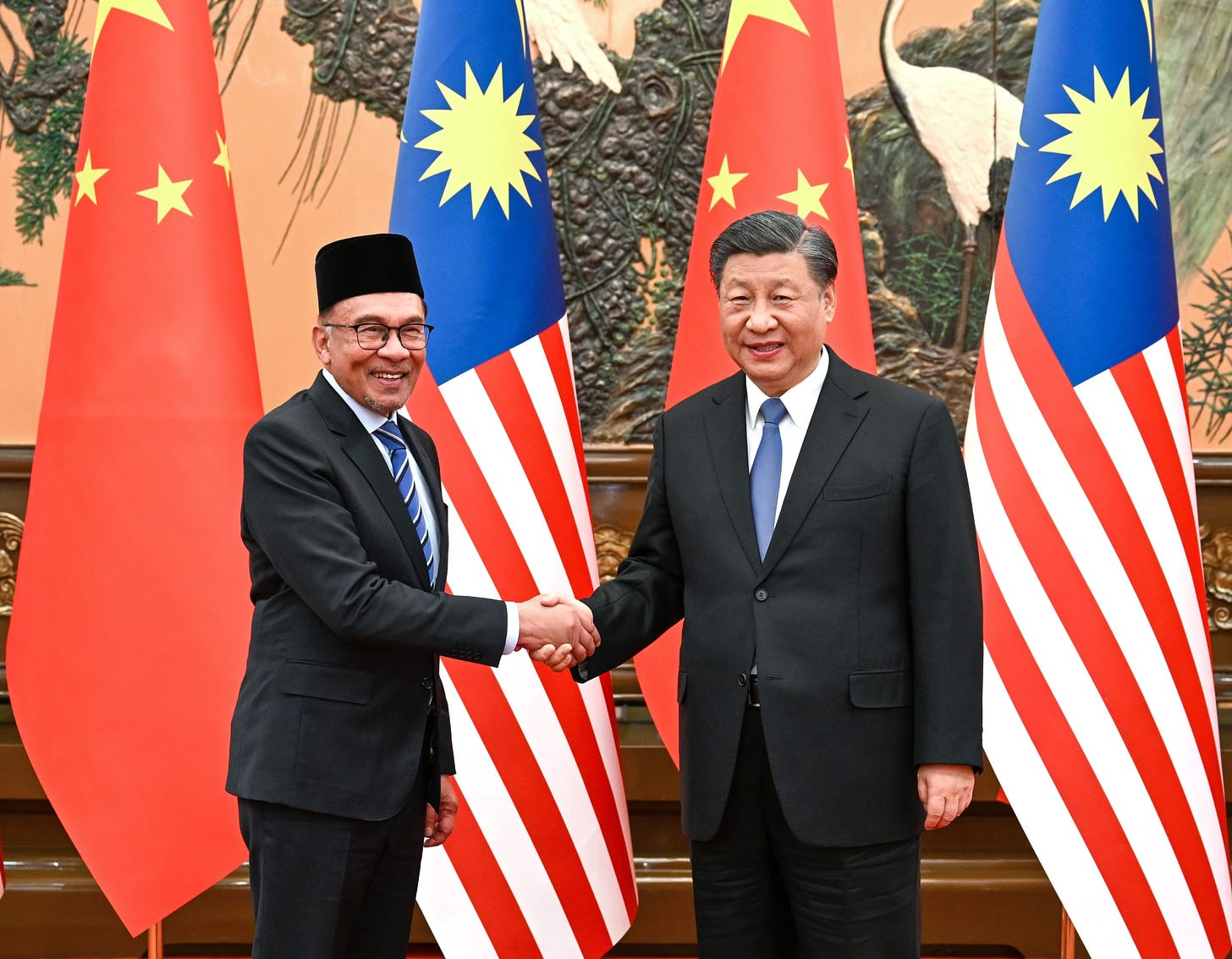Malaysia Renaissance
Chinese Premier Li Qiang visits Malaysia, enhances multilateral coordination , deepens ties with renewed economic pact, and eyes closer relations.
Chinese Premier Li Qiang visits Malaysia
By Curt Brown
Chinese Premier Li Qiang visited Malaysia between June 18 and 20, meeting with Malaysian Prime Minister Anwar Ibrahim and other senior political figures. Malaysian and Chinese firms signed 11 memorandums of understanding in relation to potential Chinese investment of RM13.2 billion ($US 2.8 billion). Li’s visit takes place in the context of heightening US government pressure on Malaysia to join its war drive against Russia and China.
Key discussions took place on June 19, with Anwar and Li holding a 30-minute private meeting, followed by bilateral talks joined by cabinet ministers from both governments. The two signed a five-year agreement to continue developing economic relations. Thirteen other agreements were signed in areas including trade and investment, agriculture, manufacturing, infrastructure and finance.
Li, Anwar, and Malaysia’s king, Sultan Ibrahim, also broke ground at the East Coast Rail Link, a 665-kilometre railway to connect the west coast and under-developed east coast of the Malaysian Peninsula by the end of 2026. The railway is a key part of the Chinese government’s Belt and Road Initiative. Li indicated that the railway could potentially be linked to Thailand, and subsequently to southern China.
A key objective for the Malaysian ruling elite is securing investment and maintaining trade with China. China has been Malaysia’s largest single import source and export destination for about 15 years. Total trade with China last year reached RM450.84 billion ($US98.9 billion), accounting for 17 percent of Malaysia’s global trade.
Trade with China also takes on vital importance in providing the means to service burgeoning debt. Currently, Malaysian government debt is RM1.5 trillion ($US320 billion), which is approximately 80 percent of GDP. Failure to service this debt could lead to default, ushering in political turmoil and the threat of social upheaval as happened in Sri Lanka in 2022.
For Beijing, a key element of Li’s visit was to cultivate the Malaysian government’s political support in order to act as a counterweight in the face of US diplomatic and military encirclement. The Chinese government faces a steady stream of aggressive US-led provocations in the South China Sea and what amounts to anti-China military alliances led by Washington including AUKUS (the US, the UK and Australia) and the Quad, comprised of the US, Japan, Australia and India.
On June 19 at a luncheon attended by 200 business leaders and Li, Anwar stated that “People say, well, Malaysia is a growing economy. Don’t let China abuse its privilege and extort from the country. I said no. To the contrary, we want to benefit from one another, we want to learn from one another and we want to profit from this engagement.”
In the lead up to Li’s visit, Anwar made statements sharper in their implied criticism of Washington. On June 15, in an interview with the South China Morning Post, Anwar commented: “[The Chinese] have been most receptive, and they collaborate well, and they are frank and [make] no display of arrogance.”
In an interview with Chinese media outlet Guancha on June 16, Anwar stated that Malaysia wanted to join the Brazil, Russia, India, China and South Africa (BRICS) economic group. This is partly to deepen trade in currencies other than the US dollar against which the Malaysian ringgit has declined sharply, giving rise to inflation and loss of investor confidence.
Anwar claimed that the rise of China “brought us a glimmer of hope that there are checks and balances in the world”. Anwar reportedly raised the topic of Malaysia joining BRICS with Li. Malaysia would be the second Southeast Asian country to commence the accession process after Thailand.
Based on reports by Chinese news agency Xinhua, Anwar and Li agreed that China and relevant countries from the 10-member Association of Southeast Asian Nations (ASEAN) should “independently and properly” handle the South China Sea issue. This is a direct rebuke of Washington’s attempts to provoke Beijing into a war in the South China Sea using the Philippines military as a proxy. Vietnam, Brunei, Malaysia, the Philippines, and China (Beijing and Taipei) each have overlapping territorial claims in the South China Sea.
Anwar regularly makes the claim that the Malaysian government is not taking sides between the US and China. During the 37th Asia Pacific Roundtable hosted by the Institute of Strategic and International Studies Malaysia on June 6 in Kuala Lumpur, Anwar stated that the contention that Malaysia takes sides is a “gross misperception.”
Washington is unwilling to accept this balancing act and is putting pressure on the Malaysian government to line up with its economic war against Russia as the US escalates the military conflict in Ukraine. In May, Jatronics Sdn Bhd, a Malaysian trading company dealing in semiconductor-related hardware, was placed under US sanctions for supplying componentry to Russia allegedly used to produce armaments.
Previously, in December, four Malaysian companies were sanctioned by Washington for allegedly supplying components used by Iran in its manufacturing of military drones, which are then sold to Russia. Professor Zachary Abuza at the National War College in Washington noted to Al Jazeera that “Malaysia is clearly under watch from the United States right now.”
Increasingly, the wars that have been stoked and those being prepared by Washington are coalescing into a broader war front. In the Middle East, Iran is seen as the chief obstacle to US dominance of the region. Russia is seen as a military rival, as well as possessing key minerals, resources and markets. China is viewed by Washington as the chief geostrategic threat given the increasing dominance of its economy.
In May for example, the British ambassador to the UN, Barbara Woodward, pointed to Iranian drones as Russia’s “weapon choice” in recent battlefield advances by the Russian military, particularly in the northeastern city of Kharkov (Kharkiv). The US government is looking to cripple Tehran by cutting off the sale of Iranian oil as it represents up to 70 percent of Iranian government revenues by some estimates. Effectively, choking off Iran’s oil sales puts extreme pressure on the Iranian regime, potentially leading to its collapse.
The head of the US military’s Central Command, General Michael Kurilla, noted in statements to a US House Armed Services Committee hearing in March that 90 percent of Iranian oil ends up in China, circumventing sanctions through ship-to-ship transfers. Until 2018, when US sanctions on Iran were re-introduced, China was the largest purchaser of Iranian oil.
In a meeting with Malaysian home minister, Saifuddin Nasution Ismail, on May 8, US under-secretary for terrorism and financial intelligence, Brian Nelson, claimed that Malaysia was facilitating Iranian oil sales in Malaysian waters. Speaking to the Malaysian press, Nelson, stated that “These are ship-to-ship [oil] transfers, particularly at night, which we see from time to time. They are really designed to obfuscate the origin of the commodity, in this case, Iranian oil.” Anwar rejected these claims, stating on May 14 that there was “not one shred of evidence” of such ship-to-ship transfers.
Read more here.
China Enhances Multilateral Coordination with Malaysia
By CGTN
Chinese Premier Li Qiang on Wednesday expressed China's willingness to enhance multilateral coordination with Malaysia to safeguard the hard-won favorable development environment in East Asia.
Li made the remarks during a meeting with Malaysia's Deputy Prime Minister and Minister of Rural and Regional Development Dato' Seri Dr. Ahmad Zahid bin Hamidi in Beijing.
Since the establishment of diplomatic relations between China and Malaysia, the two countries have respected each other and treated each other as equals, committed to developing friendly relations based on their fundamental and long-term interests, Li said.
Li said that, as this year marks the 50th anniversary of the establishment of bilateral ties between the two countries, China is willing to advance high-level exchanges in accordance with the strategic guidance of the leaders of the two countries, firmly support each other in safeguarding core interests such as sovereignty and security, make better use of their complementary economic advantages to seek synergy for development, and contribute to regional prosperity and stability.
China will strengthen strategic alignment with Malaysia, carry out key projects under Belt and Road cooperation, tap into the potential for cooperation in emerging fields such as digital economy and new energy vehicles, and expand trade volume to tighten cooperation for win-win results, Li said. He also called on both sides to engage in more exchanges and cooperation on education, culture, youth and other people-to-people areas.
Ahmad Zahid said that Malaysia stands ready to improve cooperation on economy, trade, investment, vocational education, sustainable development and other fields, promote people-to-people exchanges, and to advance the comprehensive strategic partnership between Malaysia and China.
Malaysia firmly adheres to the one-China policy and condemns all forms of "Sinophobia," he said, noting that Malaysia-China relations are not interfered with or influenced by any external forces.
Ahmad Zahid said that Malaysia is committed to advancing negotiations on the Code of Conduct in the South China Sea, and any attempts by external forces to stir up trouble in the South China Sea will not succeed. Malaysia is willing to work together with China to further deepen coordination and cooperation on regional and international affairs, he said.
Read more here.
China and Malaysia deepen ties with renewed economic pact
Ahead of visit by China’s Li, the Malaysian PM expressed a desire to join Global South countries in the BRICS alliance.
The deal, which will deepen relations between the two countries as they mark 50 years of diplomatic ties, was inked during a trip by Chinese Premier Li Qiang on Wednesday. The visit to Malaysia’s administrative capital Putrajaya was the last leg of a regional trip intended to expand China’s influence in the Asia Pacific as geopolitical tensions with the United States rise.
“China is ready to work with Malaysia,” said Li as his host, Malaysian Prime Minister Anwar Ibrahim, rolled out the red carpet for his arrival the previous evening.
“China is advancing Chinese modernisation on all fronts through high-quality development. Malaysia, on its part, is promoting national development …”
Following private talks, the two leaders witnessed the signing of various pacts, including the economic and trade deal. Officials said that the pact would bolster links between industries in priority sectors like high-level manufacturing and the digital economy.
Other agreements signed aim to promote investment in green development, combat transnational crime, and boost housing and urban development, higher education, people-to-people exchanges in science and technology, tourism and cultural cooperation, Anwar’s office said.
‘Glimmer of hope’
While trade topped the agenda publicly, Anwar’s comments ahead of the talks hinted at the geopolitical dimension.
In an interview aired before Li’s visit, he told Chinese media that Malaysia planned to join the BRICS bloc of developing economies once it had received feedback from current chair South Africa on its expression of interest.
He expressed support for the bloc’s Global South agenda, taking aim at a “Western narrative” on Israel’s war on Gaza, which he said focused excessively on Hamas’s October 7 attack on Israel.
The rise of China, he said, “brought us a glimmer of hope that there are checks and balances in the world”.
During Li’s three-day visit to Malaysia, which follows visits to New Zealand and Australia, Kuala Lumpur and Beijing are also expected to discuss the prickly issue of territorial claims in the South China Sea.
Malaysia, along with Vietnam, Brunei, the Philippines and Taiwan, disputes Beijing’s claims to almost the entire South China Sea.
However, unlike the much-publicised clashes between the Philippines and China, Malaysia’s government prefers diplomatic channels and rarely criticises Beijing, even when Chinese coastguard ships have sailed near Malaysia’s waters.
This is partly intended to protect economic ties. China has been Malaysia’s largest trading partner since 2009, with total trade last year reaching 450.84 billion ringgit ($98.90bn).
Malaysia’s Foreign Minister Mohamad Hassan said the country was seeking to “build” on cooperation established in the mid-seventies. “The good ties we have enjoyed since will allow us to manage and resolve any issue amicably,” he was quoted as saying by The Star newspaper.
Li is also expected to meet Malaysia’s king, Sultan Ibrahim, and attend a groundbreaking ceremony at a construction site for the East Coast Rail Link (ECRL), part of China’s Belt and Road Initiative on Wednesday.
Read more here.
China, Malaysia eye closer relations
By China Daily
China and Malaysia pledged on Thursday to enhance political mutual trust, step up alignment of development strategies and bolster people-to-people exchanges, with each side set to extend visa-free policies for visitors from the other country.
The two countries issued a joint declaration in Kuala Lumpur on Thursday, the final day of Premier Li Qiang's three-day official visit to the Southeast Asian country, on deepening and lifting their comprehensive strategic partnership and jointly building a China-Malaysia community with a shared future.
According to the declaration, China has agreed to extend its visa-free policy to Malaysian travelers until the end of 2025.
In return, Malaysia will extend its visa-free policy for Chinese citizens to the end of 2026, the declaration said, adding that both sides are welcome to continue discussing their mutual visa-exemption arrangement to facilitate cross-border travel.
The two countries have also agreed to work for better synergy of their development, the declaration said.
They will take the signing of a bilateral cooperation plan to promote building of the Belt and Road as an opportunity to further align their development strategies and enhance pragmatic cooperation.
Both sides agreed to strengthen cooperation on infrastructure connectivity, including on the key projects of Malaysia's East Coast Rail Link, and to expand trade, enhance financial cooperation and encourage their companies to invest in each other's country.
Malaysia welcomed China to join the Comprehensive and Progressive Agreement for Trans-Pacific Partnership. China said it will import more high-quality agricultural products and other products from Malaysia.
The two countries will also seize the opportunities brought by the digital economy, green development, artificial intelligence and energy, and discuss cooperation in fields including advanced manufacturing and technological innovation.
They agreed to carry out more cooperation in the semiconductor value chain to maintain the stability of the global supply chain.
This year marks the 50th anniversary of diplomatic ties between China and Malaysia.
The two countries agreed to vigorously engage in a series of activities in culture, tourism, religion and other fields to promote bilateral exchanges at all levels and further deepen exchanges and mutual learning between the Chinese civilization and the Islamic civilization.
Both sides confirmed that they will conduct a new round of cooperation in giant panda conservation research to commemorate the anniversary of establishing ties and advance bilateral cooperation in such research.
The two countries also voiced their intention to strengthen collaboration at multilateral occasions, saying they share extensive interests and similar positions on international affairs.
They also will work together to uphold international fairness and justice, and safeguard the unity and cooperation of the international community, according to the declaration.
Trade cooperation has played a vital role in bilateral ties, Premier Li said at a luncheon of the Malaysia-China Business Community in Kuala Lumpur on Thursday.
Bilateral trade has increased rapidly in recent years, Li said, adding that companies from the two countries will see more investment opportunities as both sides continue aligning their development strategies and upgrading their industries.
China hopes to speed up implementing various cooperation agreements with Malaysia, work with it to push forward major projects, and provide more cooperation opportunities for both sides, he said.
Li called for companies in China and Malaysia to continue to invest in the two countries and make better use of the Regional Comprehensive Economic Partnership.
Malaysian Prime Minister Anwar Ibrahim, who also attended the luncheon, said Malaysia is firmly committed to deepening its friendly ties with China, and hopes to enhance mutual understanding and cooperation with China in trade, investment, science and technology, and education.
Li arrived in Beijing on Thursday, wrapping up his eight-day trip, which also took him to New Zealand and Australia.
Read more here.







